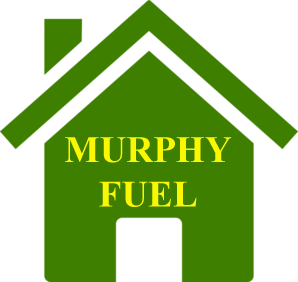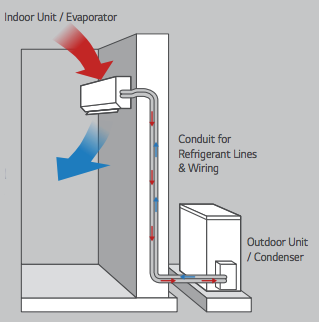Murphy Fuel is certified with Mass Save. Enjoy rebates on Murphy Fuel mini-split installations.
Call us, or click below to learn more
mini-splits can be a great choice for Air conditioning & Supplemental Heat
Mini-splits are a relatively new and constantly improving technology that provide both heating and cooling in one system. They operate on a split system with two units - an outdoor condensing unit, and an indoor evaporator unit. In the cooling mode, the system sends cool refrigerant to the indoor unit, cooling the air as it blows into the room. When in heat pump mode, the system sends hot gas to the indoor unit, heating the air as it blows into the room.
Ductless Air Conditioning
Thanks to mini-split systems, there’s a ductless option for central air conditioning. Don’t want to run ducts through your entire home? No problem. You can now install central air with minimal drilling, and you can put it precisely where you want it. The built-in zoning feature of mini-split systems provides precise control over which rooms you want to cool, enabling more efficient cooling and reducing energy bills. Being ductless, mini-splits can also be much less labor intensive and less costly to install, especially in homes that don’t already contain air ducts. Plus, mini-splits have the added function of heating, providing you an alternate and efficient heat source to help offset costs in times of high fuel prices.
Heat-Pumps Pros & Cons
Pros
Heating & Cooling - Mini-splits can provide heating and cooling in one unit. This dual function can make them a cost effective option compared to installing separate heating and air conditioning systems.
Efficient Technology - Mini-splits are engineered with advanced technology for efficiency. Rather than running at one high speed, mini-splits can ramp-up or down depending on how much heat or A/C is needed to warm or cool the room.
Alternate heat source - Sourced from electricity, heat pumps provide an option to supplement your current oil or gas system and reduce heating costs during times of high fuel prices.
Built in Zoning (mini-splits) enables greater flexibility for your system design, and greater control over where and when you use your heat or A/C. Run the heat in only certain rooms, or set a different temperature for each room - mini-splits give you complete zoning control room by room to help improve comfort & efficiency and reduce energy bills.
Ducted & Ductless - Mini-splits are available in both ducted or ductless systems, providing you options for meeting your homes needs.
Rebates - Sizeable rebates at both the federal and sate level provide significant savings on installation costs. See the “Mass Save Rebates” section of our site, or call us at 781-899-1424 to learn more.
Cons
Not as warm as fossil fuel systems - the air entering your home from heat pumps is about 80-95 degrees Fahrenheit, while the air from fossil fuel heat is about 120 degrees Fahrenheit. The 80-95 degree air from heat pumps will heat your home, but it may not have the same comforting / warming effect as fossil fuel heat. Think of a breeze on an 85 degree day - sure it’s warm air, but the breeze feels cool.
Less efficient in colder temperatures - In very cold temperatures, the 80-95 degree air from your heat pump may not be enough to offset your home’s heat loss caused by the cold outdoor temperature (depending on your home’s insulation). As a result, the heat pump may run continuously while your home never reaches it’s target temperature. This can make heat pumps less efficient and less comfortable than fossil fuel heat in cold weather.
Heating Service - Heat pumps use complex technology. Service issues may require manufacturer engineering support or factory parts that are not readily available locally. This can make service calls much more expensive than your oil heating system, and lead to longer lead times to resolve issues (meaning longer time with no heat, which can make it very risky as your only heat source! Back-up heat is strongly recommended!).
The cost of “High Efficiency” - Government mandates for certain levels of energy efficiency or environmental impacts can result in lower durability materials / equipment from manufacturer’s, which may result in more frequent service issues and shorter product life.
Rising Electric Rates make the economics for any electric heating option less attractive. It is unclear how rates will change as the government pushes for more renewable electricity production, but renewable supply options are currently more expensive than fossil fuel generated options, despite subsidies.
Power Grid vulnerability - According to some experts, the US power grid will need an overhaul to support the increasing demand for electricity. Increasing our power grid usage at a mass scale may increase the risk of failure.

